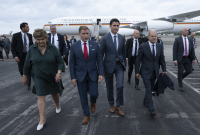Support strong Canadian climate journalism for 2025
The Canadian government appointed an adviser Tuesday to help with the creation of an Indigenous and human rights ombudsperson.
The announcement comes more than three years after the National Inquiry into Missing and Murdered Indigenous Women, Girls and Two-Spirit Peoples (MMIWG2S) delivered its findings and months after four women were killed in Winnipeg. When the office is created, the ombudsperson will have the authority to receive complaints from Indigenous communities and conduct independent evaluations of government services for Indigenous Peoples, the final report for the MMIWG2S inquiry says.
Jennifer Moore Rattray, a member of the Peepeekisis First Nation and former executive director of the national inquiry, will advise Minister of Crown-Indigenous Relations Marc Miller to help create the ombudsperson role, which was one of the calls to justice in the inquiry’s final report.
Miller made the virtual announcement on Jan. 10 following an afternoon-long virtual roundtable with national, provincial and territorial representatives. Participants hailed from governments and advocacy groups, and the session was led by the Crown-Indigenous relations minister.
Miller also announced that Innovation 7, an Indigenous organization focusing on consultation and reconciliation, was chosen to develop recommendations for an oversight mechanism to “enhance accountability and progress in ending violence towards Indigenous women, girls and 2SLGBTQI+ people,” according to a government press release.
In a press conference after the announcement, Miller told Canada’s National Observer he does not have a timeline for the creation of the ombudsperson role. Instead, he deferred to Rattray’s expertise and her required time to conduct proper consultation.
Canada’s National Observer asked the minister why it took more than three years to appoint the adviser who will help develop an ombudsperson role. It’s frustrating to watch time elapse, Miller said, but he “can’t singlehandedly, in one fell swoop, appoint an ombudsperson without the proper consultation with survivor groups and families.”
“If you look into Jennifer’s CV, that is someone who will inform me what the next steps are for an ombudsperson,” he said.
Carol McBride, president of the Native Women’s Association of Canada, was at the roundtable meeting and called it “a good start.” Everyone in the meeting was happy to finally have a forum to share knowledge and experiences across regions, she added.
McBride hopes the meetings continue on a regular basis. “If they don’t, then we lose the momentum that we started today,” she said in an interview.
Last June, the Native Women’s Association of Canada gave the government a failing grade on implementing its MMIWG2S national action plan. The association will likely publish its 2023 scorecard in June, said McBride.
“Let’s just see where it goes from here.”
Matteo Cimellaro / Canada’s National Observer / Local Journalism Initiative







Comments